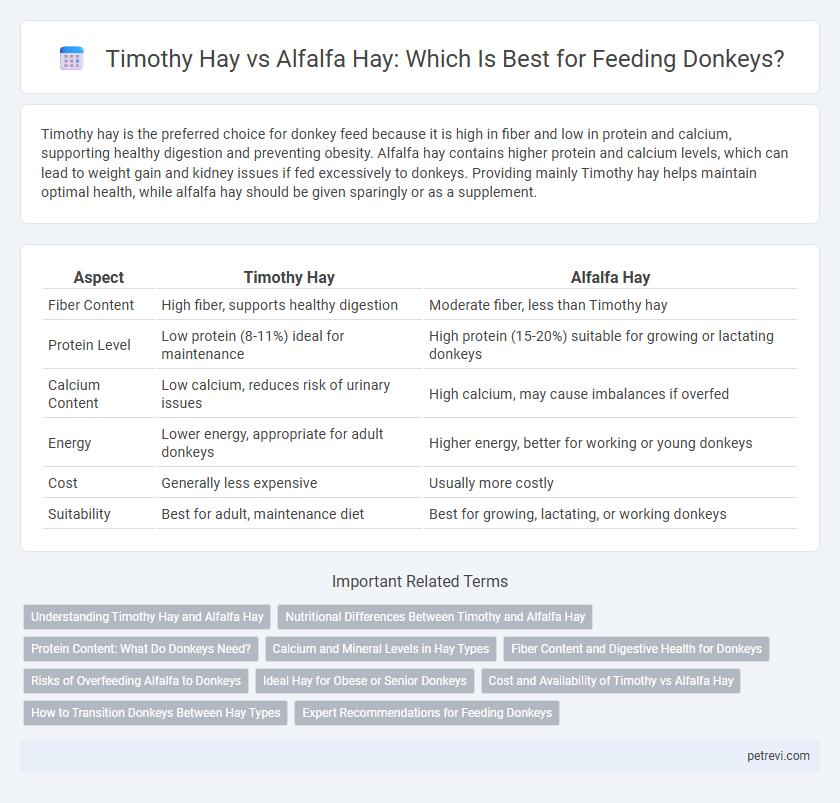Timothy hay is the preferred choice for donkey feed because it is high in fiber and low in protein and calcium, supporting healthy digestion and preventing obesity. Alfalfa hay contains higher protein and calcium levels, which can lead to weight gain and kidney issues if fed excessively to donkeys. Providing mainly Timothy hay helps maintain optimal health, while alfalfa hay should be given sparingly or as a supplement.
Table of Comparison
| Aspect | Timothy Hay | Alfalfa Hay |
|---|---|---|
| Fiber Content | High fiber, supports healthy digestion | Moderate fiber, less than Timothy hay |
| Protein Level | Low protein (8-11%) ideal for maintenance | High protein (15-20%) suitable for growing or lactating donkeys |
| Calcium Content | Low calcium, reduces risk of urinary issues | High calcium, may cause imbalances if overfed |
| Energy | Lower energy, appropriate for adult donkeys | Higher energy, better for working or young donkeys |
| Cost | Generally less expensive | Usually more costly |
| Suitability | Best for adult, maintenance diet | Best for growing, lactating, or working donkeys |
Understanding Timothy Hay and Alfalfa Hay
Timothy hay is a low-calorie, high-fiber forage ideal for donkeys, promoting healthy digestion and weight management. Alfalfa hay contains higher protein and calcium levels, making it suitable for donkeys with increased nutritional needs, such as pregnant or lactating females. Selecting the right hay depends on the donkey's age, health, and activity level to ensure balanced nutrition and overall well-being.
Nutritional Differences Between Timothy and Alfalfa Hay
Timothy hay contains lower protein and calcium levels, making it ideal for adult donkeys that require a high-fiber, low-calorie diet to avoid obesity and digestive issues. Alfalfa hay provides higher protein and calcium, supporting growth, lactation, or recovery but can lead to excess weight gain and colic if overfed in healthy donkeys. Understanding these nutritional differences helps tailor feeding plans to maintain optimal donkey health and prevent metabolic disorders.
Protein Content: What Do Donkeys Need?
Donkeys require a low-protein diet, ideally consisting of forages with protein content between 7-10%, making Timothy hay a suitable option with its moderate protein levels around 8%, promoting digestive health and preventing obesity. Alfalfa hay, with its higher protein content of approximately 18-22%, can lead to excessive protein intake, increasing the risk of kidney strain and metabolic disorders in donkeys. Feeding donkeys Timothy hay ensures balanced nutrition aligned with their natural dietary needs while minimizing health risks associated with high-protein feeds.
Calcium and Mineral Levels in Hay Types
Timothy hay contains moderate calcium levels around 0.3% to 0.5%, making it suitable for donkeys, as excess calcium can contribute to kidney issues. Alfalfa hay is rich in calcium, often exceeding 1.5%, which may lead to mineral imbalances including excessive calcium-phosphorus ratios harmful for donkey health. Minerals such as magnesium and potassium are higher in alfalfa hay, requiring careful monitoring, whereas timothy hay offers a more balanced mineral profile optimal for donkey dietary needs.
Fiber Content and Digestive Health for Donkeys
Timothy hay offers high fiber content with a balanced digestible energy profile, promoting optimal digestive health in donkeys by supporting proper gut motility and preventing colic. Alfalfa hay is richer in protein and calcium but lower in fiber, which can lead to excess energy intake and digestive disturbances if overfed. For donkeys, a diet primarily based on Timothy hay ensures sustained fiber intake critical for maintaining a healthy hindgut flora and overall digestive function.
Risks of Overfeeding Alfalfa to Donkeys
Overfeeding alfalfa hay to donkeys poses significant health risks such as obesity, laminitis, and kidney strain due to its high protein, calcium, and calorie content. Timothy hay, with its lower nutrient density and higher fiber content, is a safer primary forage that better supports donkeys' digestive systems. Excessive alfalfa consumption can disrupt the balance of the donkey's diet, leading to metabolic issues and costly veterinary care.
Ideal Hay for Obese or Senior Donkeys
Timothy hay is the ideal choice for obese or senior donkeys due to its low calorie and high fiber content, promoting healthy digestion and weight management. Alfalfa hay, being higher in protein and calcium, can contribute to weight gain and is less suitable for donkeys with limited activity or metabolic concerns. Providing Timothy hay supports optimal nutrient balance, preventing obesity-related issues and ensuring overall health in senior donkeys.
Cost and Availability of Timothy vs Alfalfa Hay
Timothy hay generally costs more than alfalfa hay due to its slower growth rate and higher demand as a preferred fiber source for donkeys. Availability of timothy hay can be limited in some regions because it requires cooler climates, whereas alfalfa hay is more widely accessible and grows abundantly in warmer areas. Choosing between these hays often depends on balancing the higher expense and regional availability of timothy hay against the lower cost and easier access to alfalfa hay.
How to Transition Donkeys Between Hay Types
When transitioning donkeys from Timothy hay to Alfalfa hay, start by gradually mixing small amounts of Alfalfa with Timothy over a 7-10 day period to avoid digestive upset. Monitor the donkey's response for signs of bloating or diarrhea, adjusting the transition speed accordingly. Maintain consistent feeding schedules and always provide fresh water to support digestive health during the change in forage.
Expert Recommendations for Feeding Donkeys
Experts recommend Timothy hay over alfalfa hay for donkey feed due to its lower protein and calcium content, which aligns better with donkeys' nutritional needs and helps prevent obesity and laminitis. Timothy hay provides adequate fiber essential for optimal digestive health and encourages natural chewing behavior, reducing the risk of dental issues. Alfalfa hay, being richer and more calorie-dense, is generally reserved for underweight or pregnant donkeys requiring additional nutrients but should be fed cautiously to avoid overfeeding.
Timothy Hay vs Alfalfa Hay for Donkey Feed Infographic

 petrevi.com
petrevi.com